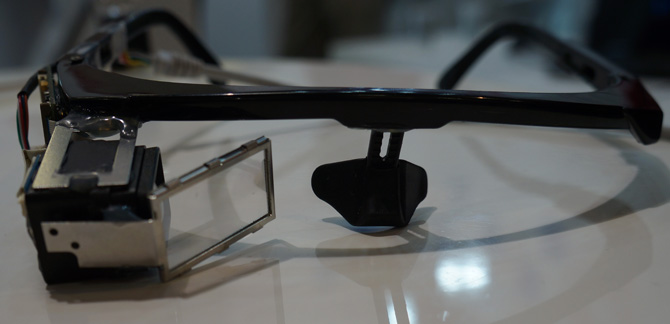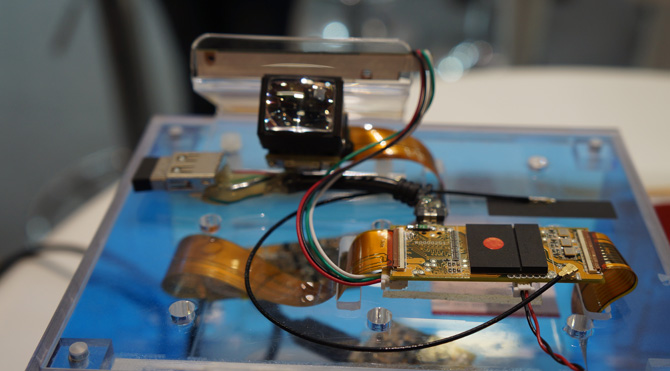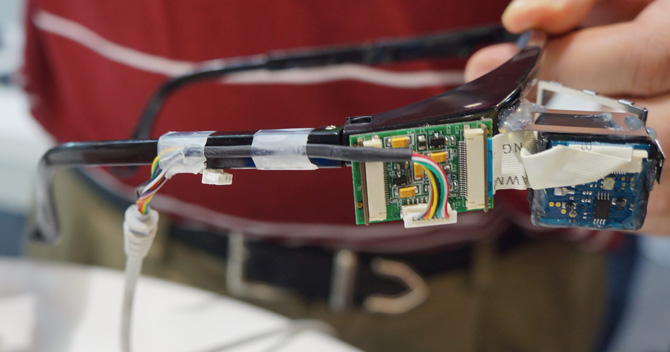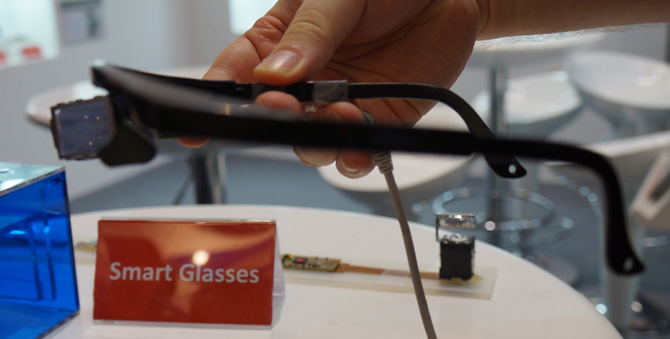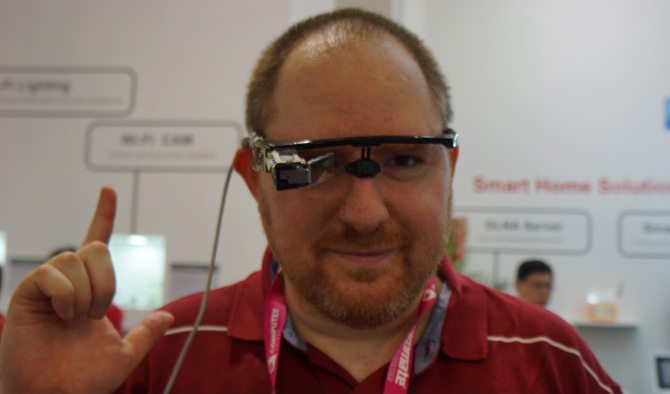Google Glass Alternative Promises Better Display, Lower Price
TAIWAN, TAIPEI -- Users pining away for Google Glass may soon be able to get a lower-cost alternative with better specs, courtesy of Oculon Optoelectronics. At Computex Taipei, the Taiwanese vendor showed off a wearable computer that has a similar form factor to Google's famous headset, but promises a better screen and longer battery life at less than half the price. We had the chance to try on a prototype of the Oculon Smart Glasses and were intrigued by its light weight, comfortable frame and impressive specs.
The prototype we tried on had a thin black plastic frame that felt extremely light on our head -- perhaps even lighter than our regular prescription glasses. The eyepiece hovered comfortably over our right eye and was easy to peer through.
The glasses weren't running their full Android OS, but we were able to view a video looping in the eyepiece. The images appeared translucent, making them easy to see through, though we found it easiest to focus on the screen with one eye closed. The screen on our prototype carried a 640 x 480-pixel resolution, but the final version will have a 720p display. We were also able to peer through a working 720p eyepiece on a table at Oculon's booth and saw a very clear image of YouTube that looked sharper and more colorful than the video we saw on the eyepiece.
Google does not disclose the resolution of its eyepiece, but recommends that apps be developed at just 640 x 360 pixels, a far cry from the HD output of Oculon's screen. Oculon also said that it will manufacture a version of its smart glasses with screens for both eyes.
On the right side of the glasses sits the CPU package, which is made by ChipSip with a dual-core Cortex-A9 CPU from Rockchip. Oculon says the same chip will be in Rockchip's RK 3 Series. If so, it should offer similar performance to the powerful processor in the Android Mini PC RK3066 we reviewed last year. That stick computer is capable of running Android 4.1 Jelly Bean and powering high-end games like Dead Trigger, so it would clearly provide more than enough speed for Oculon's Smart Glasses. Though the right side of the headset had a power cable connected to it, Oculon assured us that the final version will be completely wireless.
MORE: 6 Best Uses for an Android Mini PC
Oculon said the left side of the glasses will contain a 2,100mAH battery, which the company says will last longer on a charge than Google Glass. The final build will also have a 5-MP camera, bone-conduction speakers, a microphone and Bluetooth, Wi-Fi or cellular connectivity depending on the configuration. Like Google Glass, the device will be able to tether to a smartphone for Internet connection, but it may also get its own mobile broadband.
Sign up to receive The Snapshot, a free special dispatch from Laptop Mag, in your inbox.
Depending on the software build its partners chose, the Oculon Smart Glasses will provide speech recognition, gesture control or the ability to connect to a Bluetooth control pad for navigation. Such a controller would require users to carry a separate object with them but would likely offer superior accuracy. If the Android version isn't heavily modified, you might even be able to attach a Bluetooth keyboard.
Sales manager Eddie Chang said the company expects to go into mass production of the Smart Glasses over the next few months and is hoping to hit an MSRP of $500, but that will depend on manufacturing costs. As an OEM, Oculon will not release the Smart Glasses on its own, but instead will sell it to a variety of vendors who will take the device to market under their own brands. Chang could not disclose the names of any specific partners, but said PC vendors may license the product to offset their lackluster laptop sales or phone vendors may use it as an accessory for their handsets. We're eager to see a final working version of the Oculon Smart Glasses when it starts shipping later this year.
- 12 Obsolete Technologies Americans Still Use
- 12 Worst Android Annoyances and How to Fix Them
- 7 Ways to Reboot the Crashing PC Market

